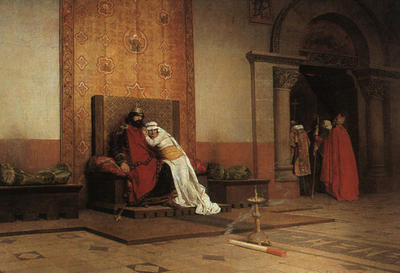1 Corinthians Chapter 5 (RSV) 1 Corinthians 11:23-29
1 It is actually reported that there is immorality among you, and of a kind that is not found even among pagans; for a man is living with his father's wife. 2 And you are arrogant! Ought you not rather to mourn? Let him who has done this be removed from among you. 3 For though absent in body I am present in spirit, and as if present, I have already pronounced judgment 4 in the name of the Lord Jesus on the man who has done such a thing. When you are assembled, and my spirit is present, with the power of our Lord Jesus, 5 you are to deliver this man to Satan for the destruction of the flesh, that his spirit may be saved in the day of the Lord Jesus.  One who scandalously lives an immoral life should be expelled from the assembly for his own good and the good of the Church. Sometimes excommunication is a necessary medicine, for by it the sinner may be brought to his senses and realize his spiritual danger.
One who scandalously lives an immoral life should be expelled from the assembly for his own good and the good of the Church. Sometimes excommunication is a necessary medicine, for by it the sinner may be brought to his senses and realize his spiritual danger.
Excommunication is a warning and a foreshadowing of the dire eternal consequences that certainly will follow if one persists unrepentant in grave sin. In this particular case Paul pronounces his binding judgment "in the name of the Lord Jesus", and imparts his authority to the church at Corinth with the command to expel the manifest sinner. Here we see a concrete exercise of apostolic authority in a disciplinary matter. Without this authority, exercised by those who legitimately bear it, the Church would be powerless to impose this serious remedy. 6 Your boasting is not good. Do you not know that a little leaven leavens the whole lump? 7 Cleanse out the old leaven that you may be a new lump, as you really are unleavened. For Christ, our paschal lamb, has been sacrificed. 8 Let us, therefore, celebrate the festival, not with the old leaven, the leaven of malice and evil, but with the unleavened bread of sincerity and truth.
Unleavened bread, the paschal lamb, "the festival"... these all are references to the Passover feast. Paul speaks not of the Old Covenant festival in which many lambs are sacrificed and consumed, but rather of the New Covenant festival foreshadowed by the old. In this new festival, the Eucharist, believers are united to the Paschal Lamb, Christ, and to His once-for-all sacrifice that transcends time. We partake of the flesh of the Paschal Lamb and drink the precious Blood He shed for us, and thereby share in His eternal life. This side of Heaven there can not be a more perfect union with Jesus than this: to receive Him -His Body and Blood, Soul and Divinity- within our souls and within our bodies; and both body and soul receive the foretaste and pledge of eternal life whose roots are sunk unshakeably deep in the rock that is Christ.
Paul draws an analogy between the bread of this feast and the Corinthians themselves, in order to illustrate a lesson. In preparation for a feast of such intimate union with God the bread must be prepared from dough unpolluted by the leaven of boasting or immorality. The Corinthians themselves are referred to not merely as preparing or partaking of the bread, but as actually being that bread. If they are to "celebrate the festival" without demeaning or contradicting its meaning, they themselves must be free from the leaven that can spoil the whole loaf of bread. 
Why is it so important that the bread -both the actual bread consumed in the festival and the figurative "bread" composed of believers- be unleavened? In chapter 11 Paul writes: 23 For I received from the Lord what I also delivered to you, that the Lord Jesus on the night when he was betrayed took bread, 24 and when he had given thanks, he broke it, and said, "This is my body which is for you. Do this in remembrance of me." 25 In the same way also the cup, after supper, saying, "This cup is the new covenant in my blood. Do this, as often as you drink it, in remembrance of me." 26 For as often as you eat this bread and drink the cup, you proclaim the Lord's death until he comes. 27 Whoever, therefore, eats the bread or drinks the cup of the Lord in an unworthy manner will be guilty of profaning the body and blood of the Lord. 28 Let a man examine himself, and so eat of the bread and drink of the cup. 29 For any one who eats and drinks without discerning the body eats and drinks judgment upon himself.
The New Covenant festival of which Paul speaks is the Eucharist, in which Christians distinguish by faith and receive the Body and Blood of the Lord Jesus, and are united with Him. This not a merely symbolic union, but a profound encounter between Jesus and the children of God. Therefore Jesus, Who is the sacrificial Lamb of the New Covenant and the Bread of Life, is united with His bride the Church, which is to be a pure and unleavened loaf set apart by God for Himself. We must not dare to attempt Eucharistic union with Jesus without first renouncing sin and asking to be made capable of such union.9 I wrote to you in my letter not to associate with immoral men; 10 not at all meaning the immoral of this world, or the greedy and robbers, or idolaters, since then you would need to go out of the world. 11 But rather I wrote to you not to associate with any one who bears the name of brother if he is guilty of immorality or greed, or is an idolater, reviler, drunkard, or robber--not even to eat with such a one. 12 For what have I to do with judging outsiders? Is it not those inside the church whom you are to judge? 13 God judges those outside. "Drive out the wicked person from among you."
In chapter 4 we were warned not to pass judgement on others. Here we are told not to hang around with "immoral men". Doesn't this imply we have to judge which men are immoral? Is Paul inconsistent? I don't think so.
I think that in chapter 4 the main points about judgement are these:
On the other hand, in chapter 5 Paul insists that a fellow believer who is living an openly immoral life should be avoided. To me it seems that this caution applies equally to our spiritual fathers as well as other fellow believers. That is, if an apostolic successor -a validly ordained bishop of the Catholic Church- is living a manifestly scandalous life then I would do well to avoid him. However, I would not do well to deny the authority he has been given, or to hold him or his brother bishops in contempt.
Jesus picked sinners to be apostles, and he has picked sinners ever since then to carry out their apostolic ministry. We are commanded by Paul to accept those sent to us -like them or not- and only in cases of manifest immorality may we have justification to pass temporary censure against other believers, especially those sent to us by the apostles to teach and guide us.
Saturday, September 10, 2005
1 Corinthians 5: Let us celebrate the festival
Posted by
John F Robin
at
9/10/2005 11:38:00 PM
![]()
Labels: Eucharist, sacraments
Subscribe to:
Post Comments (Atom)



No comments:
Post a Comment
Thoughtful comments are welcome. Thank You for visiting!.
(Comments are moderated and usually approved the same day.)